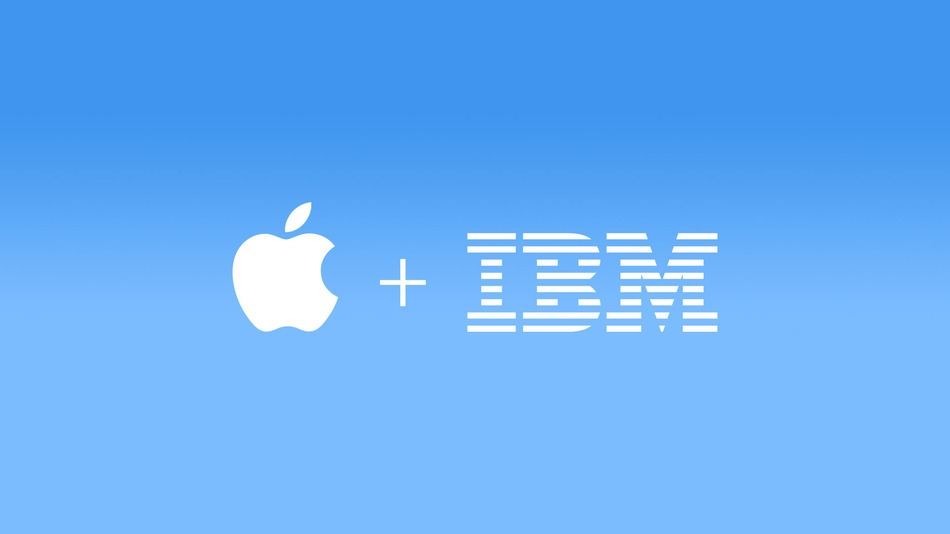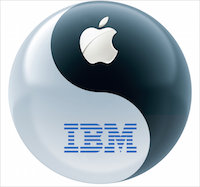Apple + IBM = I never saw this one coming


From Apple's PR page:
Apple® and IBM (NYSE: IBM) today announced an exclusive partnership that teams the market-leading strengths of each company to transform enterprise mobility through a new class of business apps—bringing IBM’s big data and analytics capabilities to iPhone® and iPad®.
That sound you heard was a great distubance in the force. I mean, this is Apple for crying out loud. They don't join the man, they destroy the man.
Yet, this is actually smart for both companies as it draws on each of their strengths to fill gaps in their weak areas. First up, Apple.
Its all about enterprise. I remember 4 years ago, soon after the iPad was released, having discussions around the office about how it would be received. We were still a BlackBerry shop at the time, with only a few of us even having iPhones (which were not supported). The thought of the iPad gaining traction anywhere, much less in the enterprise, was a joke. I even had our desktop support manager tell me that Apple mobile products would never be supported in our office. Ever.
She ate those words in short order.
Christmas came and went. January brought with it not just vacation refreshed employees, but executives who returned from the holidays with their shiny new iPads asking how to get them on the network. I simply laughed and did my best not to say, "I told you so."
Since then we've seen iPhones and iPads become not just accepted but often necessary devices for employees. During that time, IBM has divested itself of all hardware except their server business. They are not even a software company anymore but more of a services organization with acquired and supported software offerings.
Frankly, hardware left IBM behind long ago. Despite their mainframe systems still hanging on doggedly, they are destined to one day ride the big junk-heap in the sky. That door is now closed to them but without it, they've found themselves locked out of many markets. Now, in Apple, they've found someone who can do hardware better than IBM ever could on their own. They don't need to do something they're not great at, just something they can be passibly good at doing.

For Apple, if nothing else, this lends then some credibility. The old saying of "no one was ever fired for buying IBM" hasn't been true for decades, but Big Blue still holds some sway in the minds of executives. Apple isn't an enterprise company, and they don't want to be one, but many enterprises can't imagine doing business with a company that isn't one. This partnership with IBM means that those reluctant organizations no longer have to do business with Apple; they can do it with their old friend, IBM.
Apple won't need to take their focus off the consumer, diluting their staff on tasks that don't directly sell devices to their target audiences but can let IBM do all the heavy lifting of pushing through channels. Don't believe me? Apple even said as much in the press release:
As part of the exclusive IBM MobileFirst for iOS agreement, IBM will also sell iPhones and iPads with the industry-specific solutions to business clients worldwide.
And that, is all you need to know. For Apple, this is about another way for them to sell devices. Period. Instead of doing as they have for many years now, going around corporate procurement processes, they can now let their partner IBM do the heavy lifting of selling through those tough channels.
In the end, this is smart for both companies. What surprises me is that Apple picked IBM over Microsoft or Oracle, but I've got a theory there, too.
Frankly, IBM was in trouble. Despite their size, age and reputation in the market, they are a company in decline:
Under Rometty’s leadership, revenue has declined for eight consecutive quarters, a period when most of corporate America has flourished. In January, after a year in which IBM was the only company in the Dow Jones industrial average whose shares lost value, Rometty and her top executives turned down their annual bonuses, worth in her case as much as $8 million. (Rometty, 56, who goes by Ginni, declined to be interviewed for this article.)
When the CIA dumps you for being outdated, you know you're in trouble.
Oracle at least knows how buy successful companies. Microsoft, despite its numerous internal problems, has enough business to keep it going for a while. So who else had the breadth and the despiration to cut a deal that might just keep them afloat for another few years? Only IBM.